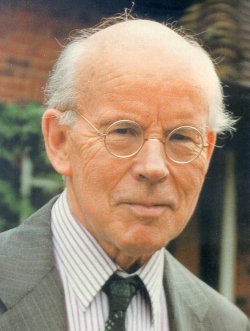Peter Tizard
Peter Tizard (1 April 1916 – 27 October 1993) was a prominent British pediatrician and neonatologist. He made significant contributions to the field of neonatal medicine and was instrumental in advancing the understanding and treatment of neonatal neurological disorders.
Early Life and Education[edit | edit source]
Peter Tizard was born in London, England. He was the son of Sir Henry Tizard, a distinguished scientist and inventor. Peter Tizard attended Marlborough College and later studied medicine at Magdalen College, Oxford, where he graduated with a degree in physiology in 1938. He completed his clinical training at St Thomas' Hospital in London.
Career[edit | edit source]
After qualifying as a doctor, Tizard served in the Royal Army Medical Corps during World War II. Following the war, he returned to St Thomas' Hospital, where he began his career in pediatrics. He later moved to the Hammersmith Hospital and the Royal Postgraduate Medical School, where he worked under the mentorship of Sir Wilfrid Sheldon.
In 1964, Tizard was appointed as the first Professor of Pediatrics at the University of Oxford. During his tenure, he established the Department of Pediatrics and the Neonatal Unit at the John Radcliffe Hospital. His research focused on the neurological development of newborns and the impact of perinatal events on long-term outcomes.
Contributions to Neonatology[edit | edit source]
Peter Tizard is best known for his pioneering work in neonatology. He conducted extensive research on neonatal asphyxia, hypoxic-ischemic encephalopathy, and cerebral palsy. His studies on the neurological examination of newborns helped to develop standardized methods for assessing the neurological status of infants.
Tizard also played a key role in the development of neonatal intensive care units (NICUs) in the United Kingdom. His work emphasized the importance of early intervention and specialized care for premature and critically ill newborns.
Honors and Awards[edit | edit source]
Throughout his career, Peter Tizard received numerous accolades for his contributions to medicine. He was elected a Fellow of the Royal College of Physicians and the Royal College of Paediatrics and Child Health. In 1981, he was awarded the James Spence Medal by the British Paediatric Association for his outstanding contributions to pediatric medicine.
Personal Life[edit | edit source]
Peter Tizard was married to Mary Tizard, a distinguished child psychiatrist. They had three children, including Barbara Tizard, a noted psychologist. Peter Tizard passed away on 27 October 1993.
Legacy[edit | edit source]
Peter Tizard's work laid the foundation for modern neonatal care and significantly improved the outcomes for countless newborns. His contributions to the understanding of neonatal neurological disorders continue to influence the field of pediatrics and neonatology.
See Also[edit | edit source]
References[edit | edit source]
External Links[edit | edit source]
Search WikiMD
Ad.Tired of being Overweight? Try W8MD's NYC physician weight loss.
Semaglutide (Ozempic / Wegovy and Tirzepatide (Mounjaro / Zepbound) available. Call 718 946 5500.
Advertise on WikiMD
|
WikiMD's Wellness Encyclopedia |
| Let Food Be Thy Medicine Medicine Thy Food - Hippocrates |
Translate this page: - East Asian
中文,
日本,
한국어,
South Asian
हिन्दी,
தமிழ்,
తెలుగు,
Urdu,
ಕನ್ನಡ,
Southeast Asian
Indonesian,
Vietnamese,
Thai,
မြန်မာဘာသာ,
বাংলা
European
español,
Deutsch,
français,
Greek,
português do Brasil,
polski,
română,
русский,
Nederlands,
norsk,
svenska,
suomi,
Italian
Middle Eastern & African
عربى,
Turkish,
Persian,
Hebrew,
Afrikaans,
isiZulu,
Kiswahili,
Other
Bulgarian,
Hungarian,
Czech,
Swedish,
മലയാളം,
मराठी,
ਪੰਜਾਬੀ,
ગુજરાતી,
Portuguese,
Ukrainian
Medical Disclaimer: WikiMD is not a substitute for professional medical advice. The information on WikiMD is provided as an information resource only, may be incorrect, outdated or misleading, and is not to be used or relied on for any diagnostic or treatment purposes. Please consult your health care provider before making any healthcare decisions or for guidance about a specific medical condition. WikiMD expressly disclaims responsibility, and shall have no liability, for any damages, loss, injury, or liability whatsoever suffered as a result of your reliance on the information contained in this site. By visiting this site you agree to the foregoing terms and conditions, which may from time to time be changed or supplemented by WikiMD. If you do not agree to the foregoing terms and conditions, you should not enter or use this site. See full disclaimer.
Credits:Most images are courtesy of Wikimedia commons, and templates, categories Wikipedia, licensed under CC BY SA or similar.
- 1916 births
- 1993 deaths
- British pediatricians
- Neonatologists
- Alumni of Magdalen College, Oxford
- Academics of the University of Oxford
- Fellows of the Royal College of Physicians
- Fellows of the Royal College of Paediatrics and Child Health
- People educated at Marlborough College
- Royal Army Medical Corps officers
- British Army personnel of World War II
- Medicine
Contributors: Prab R. Tumpati, MD

